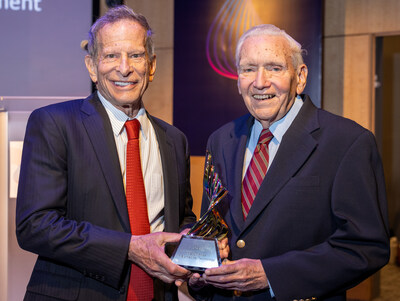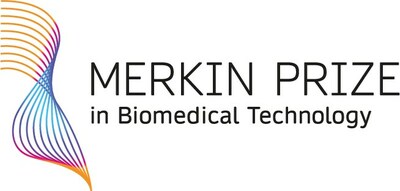F. William Studier receives the 2024 Merkin Prize in ceremony at the Broad Institute for developing technology used to produce millions of doses of COVID-19 vaccines
The groundbreaking, scalable technology is widely used in laboratories around the world today to efficiently produce large amounts of protein and RNA.
CAMBRIDGE, Mass., Oct. 16, 2024 /PRNewswire/ -- The 2024 Richard N. Merkin Prize in Biomedical Technology was awarded to F. William Studier of Brookhaven National Laboratory in a ceremony and symposium at the Broad Institute on September 17, 2024. The prize, created by the Merkin Family Foundation and administered by the Broad, recognizes novel technologies that have significantly improved human health and carries a $400,000 award. [Event Video]
Studier was announced as the winner in May for his development, in 1986, of an efficient, scalable method of producing RNA and proteins in the laboratory. His T7 expression technology can be used to make large quantities of nearly any RNA or protein. The approach has been — and continues to be — a mainstay of biomedical research and the workhorse for producing the mRNA COVID-19 vaccines, which have extended millions of lives, and numerous other therapeutics and diagnostics. [Studier Bio]
In remarks at the symposium, Richard N. Merkin, MD praised Studier for his innovative spirit. "I asked Bill what stimulated him, and he said, 'I made sure I did not embrace the status quo, that I did not embrace incrementalism. I'm a pattern breaker. I wanted to break the patterns that others had used, and depart from current habits, challenging conventional wisdom.' That's what this award is about."
Turning to Studier, Dr. Merkin added, "There are many people in the audience that have a crazy idea, that don't want to change things five percent, but want to change things tenfold. Those are the people that will change the world. Bill, you're the epitome of that. You have helped millions of people. Biomedicine has changed because of you, and humanity needs to acknowledge people like you."
Nobel laureate Harold Varmus, the Lewis Thomas University Professor at Weill Cornell Medicine and chair of the Merkin Prize selection committee, gave an overview of the prize, applauding its emphasis on technologies that have made a significant impact on biomedicine. "Discovery does not occur without the invention of technologies. It's tools and technologies that allow us to see further than others have seen, and to make those discoveries that are all too often the meat and potatoes of recognition."
Todd Golub, director and founding core institute member of the Broad Institute, thanked Merkin, whose philanthropic partnership with the Broad has spanned more than 15 years. "Dick Merkin is the most uncommon of philanthropists. He has a humble, self-effacing demeanor, and yet he is great at pushing people to make bold bets and to try to make the impossible possible."
Venki Ramakrishnan, group leader at the MRC Laboratory of Molecular Biology in Cambridge, England, who won the 2009 Nobel Prize in Chemistry and served on the Merkin Prize selection committee, introduced the scientific talks and also praised Studier's professionalism, humility, and generosity, "Bill has always been what we think of as a scientist's scientist. Anything he did, he shared with the entire scientific community. And now, there's probably not a single lab in this building that has not used the T7 system."
Studier, his wife Susan, his family, former colleagues and guests attended the ceremony that included a symposium, reception, and private dinner. Attending the Merkin Prize honors at the Broad for the first time this year were Gerun Riley, President of The Eli and Edythe Broad Foundation, and Edythe Broad, Co-Founder of The Eli and Edythe Broad Foundation.
"It is so important to recognize groundbreaking science and the remarkable individuals who have made a difference so more people are aware of these achievements," said Edythe Broad. "If Eli were here, he would be incredibly proud of what Dick has accomplished," she continued. "It's changing the world."
At the symposium, John Shanklin, chair of biology at Brookhaven National Laboratory, who considered Studier a mentor for many years, described the world-changing impact of the T7 expression technology. Pardis Sabeti, a core institute member at the Broad and a professor at Harvard University and Harvard T.H. Chan School of Public Health, lauded Studier for how the technology has enabled strategies for infectious disease control. In a video message, Melissa J. Moore, chief scientific officer emerita of Moderna Therapeutics emphasized how T7 has enabled scientists to generate RNA at an industrial scale, proving to be the workhorse for making mRNA Covid-19 vaccines. Fei Chen, core institute member at the Broad, an assistant professor at Harvard University, and a 2021 Merkin Institute Fellow, discussed his lab's use of T7 polymerase to build a new set of programmable tools.
Dr. Merkin's partnership with the Broad includes the Merkin Institute Fellows, established in 2012 as the Broad's first endowed fellowship; the Merkin Institute for Transformative Technologies in Healthcare, launched in 2017 to support paradigm-shifting projects from researchers at the Broad, Harvard, MIT, and the Harvard-affiliated hospitals; the Richard Merkin Professorship (also established in 2017), an endowed professorship held by David Liu, who leads the Merkin Institute for Transformative Technologies in Healthcare; and a generous new commitment in 2021 that advanced the aforementioned programs and launched the Merkin Prize. It was also in 2021 that, in recognition of Merkin's partnership, the Broad named its building at 415 Main Street the Richard N. Merkin Building.
Nominations for the 2025 Merkin Prize are now open and will close on December 6, 2024, at 11:59 p.m. ET.
For further information on how to nominate for the 2025 Merkin Prize, please visit the prize website. Eligibility extends to all investigators who have developed relevant health innovations, regardless of their place of employment, including academia, the commercial sector, or government. Both teams and individuals who have made a profound impact on medicine by pioneering a transformative technology are eligible.
About the Merkin Family Foundation
The Merkin Family Foundation was founded by visionary health care executive Richard Merkin, MD.
Richard Merkin, MD is the founder and CEO of Heritage Provider Network, Inc. (HPN). HPN is one of the largest physician founded and physician owned managed care organizations in the country dedicated to value-based healthcare delivery improvements. HPN develops and manages coordinated, patient-doctor centric, integrated health care systems that offer some of the strongest solutions for the future of health, care, and cost in the United States. HPN and its affiliates operate in New York, California, and Arizona, providing high-quality, cost-effective healthcare with over one million patient members. HPN is dedicated to quality, affordable health care, and putting patients' wellness first.
About Broad Institute of MIT and Harvard
Broad Institute was launched in 2004 to empower this generation of scientists to transform medicine. The Broad Institute seeks to describe the molecular components of life and their connections; discover the molecular basis of major human diseases; develop approaches to diagnostics and therapeutics; and disseminate discoveries, tools, methods, and data to the entire scientific community.
Founded by MIT, Harvard, Harvard-affiliated hospitals, and the visionary Los Angeles philanthropists Eli and Edythe L. Broad, the Broad Institute includes faculty, professional staff, and students from throughout the MIT and Harvard biomedical research communities and beyond, with collaborations spanning over 100 private and public institutions in more than 40 countries worldwide.
![]() View original content to download multimedia:https://www.prnewswire.com/news-releases/f-william-studier-receives-the-2024-merkin-prize-in-ceremony-at-the-broad-institute-for-developing-technology-used-to-produce-millions-of-doses-of-covid-19-vaccines-302277198.html
View original content to download multimedia:https://www.prnewswire.com/news-releases/f-william-studier-receives-the-2024-merkin-prize-in-ceremony-at-the-broad-institute-for-developing-technology-used-to-produce-millions-of-doses-of-covid-19-vaccines-302277198.html
SOURCE Broad Institute of MIT and Harvard

 Index Options
Index Options CME Group
CME Group Nasdaq
Nasdaq Cboe
Cboe TradingView
TradingView Wall Street Journal
Wall Street Journal
